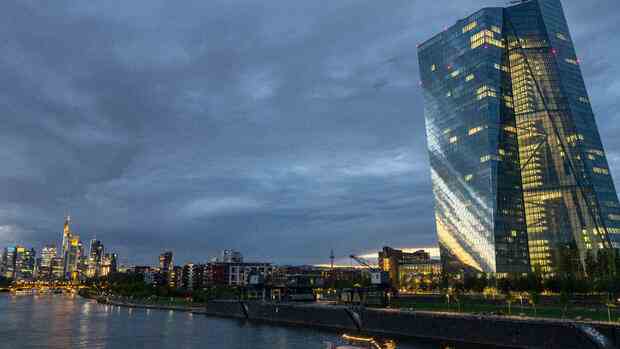Second-round effects will drive inflation over the next few months.
(Photo: dpa)
Dusseldorf, Frankfurt Consumer prices in the euro area in January compared to the same month last year by 8.5 percent increased. This was announced by the European statistical office Eurostat on Wednesday based on an initial estimate.
This means that inflation in the euro zone continued to weaken in January – because the inflation rate was still 9.2 percent in December. Analysts had forecast a value of 9.0 percent for January.
For the European Central Bank (ECB), the significant drop ahead of its council meeting on Thursday is good news. However, economists warn against underestimating the inflation problem. Core inflation, i.e. the price increase adjusted for energy, food and tobacco, is considered a warning signal. It remained at the record value of 5.2 percent – as in December. Central bankers pay close attention to core inflation because it is considered a good signal for the medium-term price trend.
“The inflation rate in the euro area has peaked. But this is no reason to give the all-clear,” says Commerzbank economist Christoph Weil. From his point of view, inflation would be significantly higher without government measures to cushion higher energy prices.
He assumes that the core rate did not rise only because of statistical adjustments at the beginning of the year. The usual drop in prices for package tours at the beginning of the year was included in the calculations with about twice as much weight as in January 2022.
Experts also urge caution when interpreting the figures because they are less complete. The European statisticians have no current data for Germany due to a software problem. Therefore, they had to resort to econometric estimates. However, these are considered less reliable, especially in the current environment, in which there have been greater deviations from previous trends.
Price increases on a broader basis
In view of the high level of core inflation, Tomasz Wieladek, European economist at the US fund company T. Rowe Price, expects that the ECB will stick to its restrictive monetary policy in the coming months. It signals that prices in the euro area are now picking up across the board. While the rapid rise in inflation up until the summer of last year was still mainly driven by energy, the price level is currently rising in almost all categories of goods.
This is due to so-called second-round effects, i.e. price increases in response to increased costs. For example, higher kerosene costs also drive up prices for air travel and higher heating costs drive up prices in the catering trade.
The transfer usually takes place with a time delay. It is therefore not unusual for core inflation to remain at a high level after a strong energy price shock, explains expert Wieladek.
There are also second-round effects in wage developments. Trade unions are increasingly demanding higher wages with reference to the higher cost of living. This translates more and more into the price level. ECB chief economist Philip Lane wrote in a blog post late last year that wages would be “the primary driver of inflation over the next few years.”
More: Change of course in monetary policy – who will cut interest rates first?
